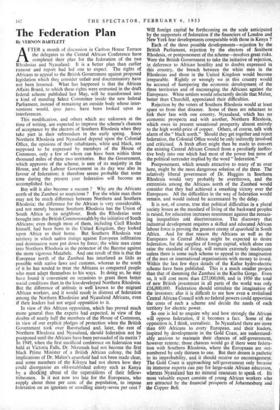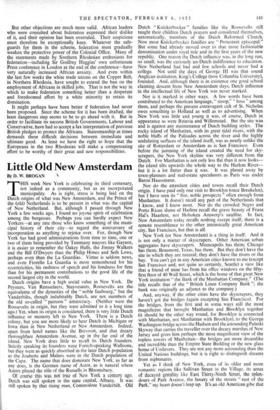The Federation Plan
By VERNON BARTLETT
AFTER a month of discussion in Carlton House Terrace the delegates to the Central African Conference have completed their plan for the federation of the two Rhodesias and Nyasaland. It is a better plan than earlier rumour and report had led one to expect. The rights of Africans to appeal to the British Government against proposed legislation which they consider unfair and discriminatory have not been lessened. What has happened is that the African Affairs Board, to which these rights were entrusted in the draft federal scheme published last May, will be transformed into a kind of standing Select Committee inside the new federal Parliament, instead of remaining an outside body whose inter- ventions would, ipso facto, have been looked upon as interferences.
This modification, and others which are unknown at the time of writing, are expected to improve the scheme's chances of acceptance by the electors of Southern Rhodesia when they take part in their referendum in the early spring. Since Northern Rhodesia and Nyasaland depend upon the Colonial Office, the opinions of their inhabitants, white and black, are supposed to be expressed by members of the House of Commons, only a few of whom can have been within three thousand miles of these two territories. But the Government, -which approves of the scheme, is sure of its majority in the House, and the Labour Government in its day was also in favour of federation; it therefore seems probable that some time during the present year federation will become an accomplished fact.
But will it also become a success ? Why are the Africans north of the Zambesi so suspicious ? For the white man there may not be much difference between Northern and Southern Rhodesia; the difference for the African is very considerable, and not merely because Southern Rhodesia has the Union of South Africa as its neighbour. Both the Rhodesias were brought into the British Commonwealth by the initiative of South Africans; even though most of them, including Cecil Rhodes himself, had been born in the United Kingdom, they looked upon Africa as their home. But Southern Rhodesia was territory in which native risings against European infiltration and domination were put down by force; the white man came into Northern Rhodesia as the protector of the Barotse against the more vigorous Matabele. And one result of this is that the European north of the Zambesi has interfered as little as possible with native laws and customs, whereas to the south of it he has tended to treat the Africans as conquered people who must adapt themselves to his ways. In doing so, he may have found it convenient on occasions to grant them better social conditions than in the less-developed Northern Rhodesia. But the difference of attitude is well known to the migrant African workers, and it would result in distrust of federation among the Northern Rhodesian and Nyasaland Africans, even if their leaders had not urged opposition to it..
In view of this African opposition, which has proved much more general than the experts had expected, in view of the doubts of nearly half the members of the House of Commons, in view of our explicit pledges of protection when the British Government took over Barotseland and, later, the = rest of Northern Rhodesia and Nyasaland, should federation not be postponed until the Africans have been persuaded of its merits ? In 1949, when the first unofficial conference on federation was held at Victoria Falls, Dr. Nkrumah had not become the first black Prime Minister of a British African colony, the full implications of Dr. Malan's apartheid had not been made clear, and some members of the Kikuyu had not shown how they could disorganise an old-established colony such as Kenya by a shocking abuse of the superstitions of their fellow• tribesmen. Is it not now too late for the Europeans, who supply about three per cent. of the population, to impose federation on an ignorant or unwilling ninety-seven per cent ? Willforeign capital be forthcoming on the scale anticipated by the supporters of federation if the financiers of London and New York fear developments comparable with those in Kenya ?
Each of the three possible developments—rejection by the British Parliament, rejection by the electors of Southern Rhodesia, or postponement of the scheme—involves great risks. Were the British Government to take the initiative'of rejection, in deference to African hostility and to doubts expressed in this country, the breach between the white men in the Rhodesias and those in the United Kingdom would become irreparable. Rightly or wrongly we in this country would be accused of hampering the economic development of the three territories and of encouraging. the Africans against the Europeans. White settlers would reluctantly decide that Malan, better than Churchill, appreciated their difficulties.
Rejection by the voters of Southern Rhodesia would at least spare us from that disaster. Some of them are reluctant to link their fate with one country, Nyasaland, which has no economic prospects and with another, Northern Rhodesia, which owes its present sensational prosperity almost entirely to the high world-price of copper. Others, of course, talk with alarm of the " black north." Should they get together and reject federation, the Colonial Office would be only indirectly involved - and criticised. A fresh effort might then be made to convert the existing Central African Council from a peculiarly ineffec- tive body into one which had most of the power but none of the political surrender implied by, the word " federation."
Postponement, which sounds attractive to many of us over here, might be the most dangerous solution of the three. The relatively liberal government of Dr. Huggins in Southern Rhodesia would very probably be overthrown, and the extremists among the Africans north of the Zambesi would consider that they had achieved a smashing victory over the Europeans. All the difficulties in the way of federation would remain, and would indeed be accentuated by the delay.
It is not,. of course, true that political difficulties in a plural society lessen as the standard of living of the backward peoples is raised, for education increases resentment against the remain- ing inequalities mid discrimination. The discovery that industrial development requires a skilled and educated African labour force is proving the greatest enemy of apartheid in South Africa. And for that reason the Africans as well as the Europeans in Central Africa might be expected to desire federation, for the supplies of foreign capital, which alone can raise the standard of living, will remain extremely inadequate unless there is some such scheme to appeal to the imagination of the men or international organisations with money to invest. Within the last few -days details of the Kafue hydro-electric scheme have been published. This is a much smaller project than that of damming the Zambesi in the Kariba Gorge. Even so. it will cost more than £27,000,000, and in 1950 the total of new British investment in all parts of the world was only £16,000,000. Federation should stimulate the imagination of the investors; also it is difficult to see how even il revitalised Central African Council with no federal powers could apportion the costs of such a scheme and decide the needs of each territory for electric power.
So one is led to enquire why and how strongly the African will oppose federation, if it becomes a fact. Some of the opposition is, I think, unrealistic. In Nyasaland there are more than 600 Africans to every European, and their leaders, inspired by developments in the Gold Coast, are understand- ably anxious to maintain their chances of self-government, however remote; those chances would go if there were federa- tion with Southern Rhodesia, where the Europeans are out- numbered by only thirteen to one. But their dream is pathetic in its improbability, and it should receive no encourageme9t. The Gold Coast is approaching self-government only because its immense exports can pay for large-scale African education, whereas Nyasaland has no mineral resources to speak of. RS most valuable export consists of young African workers who are attracted by the financial- prospects of Johannesburg and the Copper Belt. - But other objections are much more valid. African leaders who were consulted about federation expressed their dislike of it, and their opinion has been overruled. Their suspicions must therefore be exceptionally keen. Whatever the safe- guards for them in the scheme, federation must gradually weaken the protective power of the Colonial Office. Many of the statements made by Southern Rhodesian enthusiasts for federation—includirig Sir Godfrey Huggins' own unfortunate Press conference in London at the end of the conference—have very naturally increased African anxiety. And even within the last few weeks the white trade unions on the Copper Belt, in Northern Rhodesia, have sought to extend the ban on the employment of Africans in skilled jobs. That is not the way in which to make federation something better' than a desperate and foredoomed effort by a white minority to retain its domination.
It might perhaps have been better if federation had never been proposed. Since the scheme for it has been drafted, the least dangerous step seems to be to go ahead with it. But in order to facilitate its success British Governments, Labour and Conservative, have had to accept a lax interpretation of previous British pledges to protect the Africans. Statesmanship at times demands these difficult decisions between immediate and ultimate good. At least we have the right to hope that the Europeans in the two Rhodesias will make a compensating effort to be worthy of their great and new responsibilities.



































 Previous page
Previous page